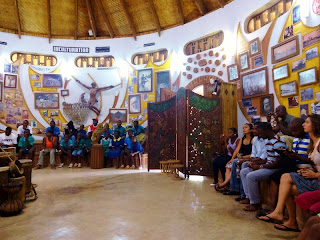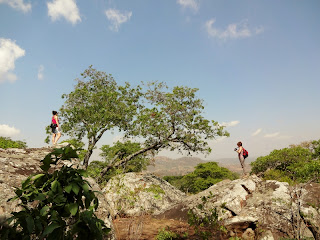For anyone who plans to travel for any extensive period and is struggling with giving up her 'real' books in favor of one of those new-fangled e-books, I have only one thing to say: DO IT. As a recent convert and avowed book addict, I cannot praise the wonders of this invention enough.
I cheaped out and purchased the basic Kindle. In hindsight, it probably would have made more sense to get one with a touchscreen and built-in light, considering how frequent the power outages are in this region. That being said, I assume those functions use up battery life quicker and my basic Kindle lasts for weeks of nightly reading before needing to be recharged.
Things that make me love my Kindle
Portability.
No matter how long the book, it always fits in my purse or carry-on when traveling.
Free reads.
There are many ways to not pay a single cent for the books you read. There are thousands of literature classics that are off copyright and so can be read for free. Amazon also offers a running list of free books on their website that you can find by entering '0.00' into the search bar after selecting the 'Kindle' filter on amazon.com. In addition, Amazon has a rotating list of books that it temporarily offers for free. I find the best way to catch them is to put all the books I want to read onto my Wish List and then periodically sort them by price to see which ones are at 0.00. Only one or two are ever listed as 0.00 at a time, but it does work. Alternatively, I also signed up to receive emails from hundredzeros.com, which gives you a daily list of free books on Amazon. (At least, they are supposed to be all free, but some of them aren't, for reasons I don't understand.)
Alternatively, many libraries now offer e-book loans, just like checking out hard copy books. Every library is different in what it offers and how easy its service is to use. I used to cheat the 2 week system by turning off the wireless on my device so that the book couldn't be 'returned' until I was finished with it. Obviously, this only works if you don't plan on checking out any other books during that time.
Versatility
If, for some reason, you don't have your Kindle device with you (or you don't want people to know you are reading a book), you can also read your e-books on the computer for free, with the Kindle PC app. In fact, a friend of mine doesn't own a Kindle device at all but has signed up with Amazon and reads books on her computer only.
Evidently, there are even more options on the newer versions of these devices that let you play games, solve puzzles, etc. While I haven't experienced those myself, I can only assume that they make the e-book even more awesome. It will never be a smartphone, but for those of use who don't relish traveling with such expensive and sought-after-by-thieves devices, this is a pretty good second choice.
I cheaped out and purchased the basic Kindle. In hindsight, it probably would have made more sense to get one with a touchscreen and built-in light, considering how frequent the power outages are in this region. That being said, I assume those functions use up battery life quicker and my basic Kindle lasts for weeks of nightly reading before needing to be recharged.
Things that make me love my Kindle
Portability.
No matter how long the book, it always fits in my purse or carry-on when traveling.
 |
| Reading by the river in Zomba |
There are many ways to not pay a single cent for the books you read. There are thousands of literature classics that are off copyright and so can be read for free. Amazon also offers a running list of free books on their website that you can find by entering '0.00' into the search bar after selecting the 'Kindle' filter on amazon.com. In addition, Amazon has a rotating list of books that it temporarily offers for free. I find the best way to catch them is to put all the books I want to read onto my Wish List and then periodically sort them by price to see which ones are at 0.00. Only one or two are ever listed as 0.00 at a time, but it does work. Alternatively, I also signed up to receive emails from hundredzeros.com, which gives you a daily list of free books on Amazon. (At least, they are supposed to be all free, but some of them aren't, for reasons I don't understand.)
Alternatively, many libraries now offer e-book loans, just like checking out hard copy books. Every library is different in what it offers and how easy its service is to use. I used to cheat the 2 week system by turning off the wireless on my device so that the book couldn't be 'returned' until I was finished with it. Obviously, this only works if you don't plan on checking out any other books during that time.
 |
| Passing the long journey to Lake Malawi on public transport by reading |
Versatility
If, for some reason, you don't have your Kindle device with you (or you don't want people to know you are reading a book), you can also read your e-books on the computer for free, with the Kindle PC app. In fact, a friend of mine doesn't own a Kindle device at all but has signed up with Amazon and reads books on her computer only.
Evidently, there are even more options on the newer versions of these devices that let you play games, solve puzzles, etc. While I haven't experienced those myself, I can only assume that they make the e-book even more awesome. It will never be a smartphone, but for those of use who don't relish traveling with such expensive and sought-after-by-thieves devices, this is a pretty good second choice.
.jpg)
.jpg)
.jpg)
.jpg)
.jpg)
.jpg)
.jpg)
.jpg)
.jpg)
.jpg)



















.jpg)

.jpg)











